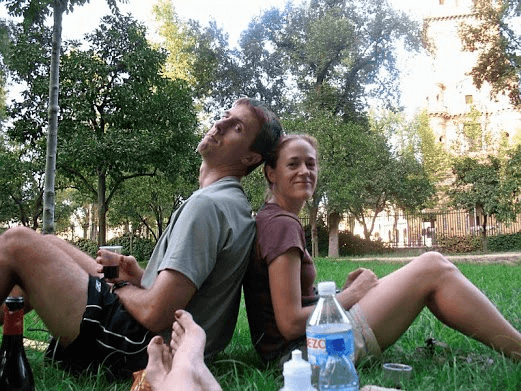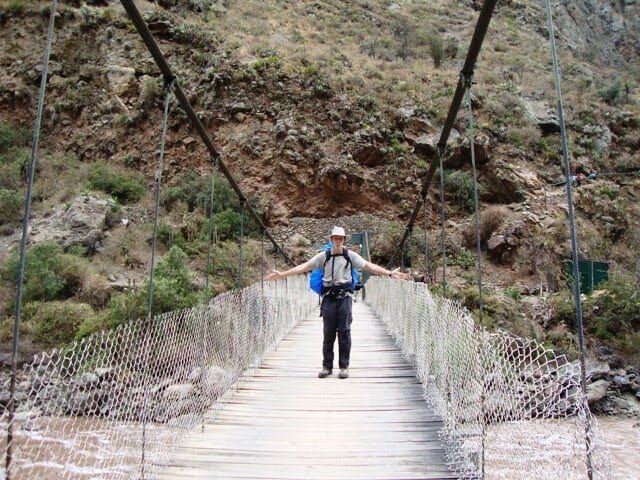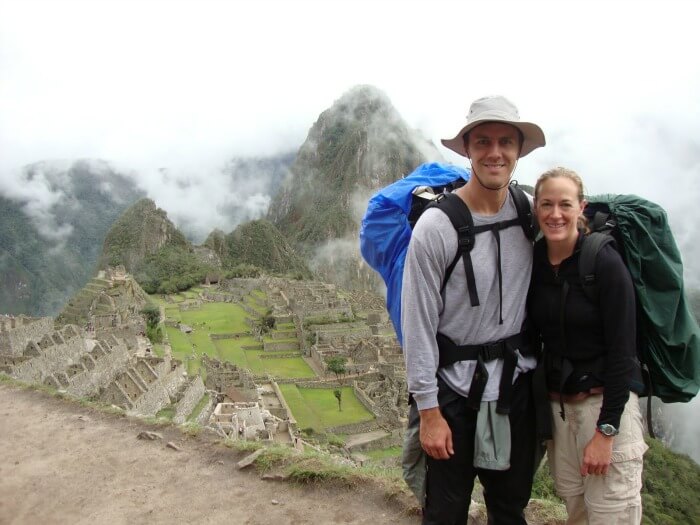In Oliver Stone’s iconic movie, Wall Street, Charlie Sheen plays a young hotshot in the stock market. At one point he shares a secret dream with his girl friend:
“I think if I can make a bundle of cash before I’m thirty and get out of this racket, I’ll be able to ride my motorcycle across China.”
Charlie Sheen’s character assumes that “a bundle of cash” is the only thing holding him back from his dream. But in reality, money is probably the easiest part of his equation.
In one of my favorite books called Vagabonding, the author Rolf Potts comments about this same movie scene:
“After all, Charlie Sheen or anyone could work for eight months as a toilet cleaner and have enough money to ride a motorcycle across China.”
This Wall Street hotshot and many of us miscalculate the real cost of our dreams. The real obstacle isn’t always money.
Instead, most of us lack options, flexibility, time, and the courage to move against the tide of our own society.
Ironically, the soul-sucking job that is supposed to buy Charlie Sheen’s dream is really the heavy ball and chain that keeps him from it.
My Escape to a Life of More Options
I first realized the power of more life options in 2009 at 29 years old. That year, in the depth of the Great Recession and real estate meltdown, I set out with my wife on a four-month odyssey. During this mini-retirement, we traveled through Spain, Peru, Patagonia, the tip of South America, and back up to Buenos Aires, Argentina.
We didn’t ride a motorcycle, although that would’ve been fun! Our preferred methods of transport were buses, taxis, and our own feet.



When we took this trip we were financially in good shape, but we had not yet reached full financial independence. And although we made good income leading up to this trip, we both could have made much more in other job opportunities.
What made this trip possible (and others since then – like our 17-month family trip to Ecuador in 2017-2018) were:
- Flexible sources of income (originally entrepreneurial jobs and eventually rental income)
- Low personal financial overhead (no personal debt except a small home mortgage)
- Simple (but still very comfortable) lifestyle
- Strong relationships with people at home to hold down the ship
This 2009 trip demonstrated to us what I think Charlie Sheen’s character could have learned:
The best experiences in life come from deliberate choices, simple ways of living, and close relationships, not just from “bundles of cash.”
Our 2009 trip opened our eyes to another world of possibilities. We decided to pursue a life of options instead of maximum wealth (although wealth was certainly still a goal).
Luckily, there were many unorthodox role models from the past and present to study. One of my favorites was Henry David Thoreau.
The Patron Saint of Simplicity
Henry David Thoreau is really the patron saint of choosing options over money. He has three quotes from the classic book Walden (or Life in the Woods) that distill the idea beautifully.
“A man is rich in proportion to the number of things which he can afford to let alone.”
“Superfluous wealth can buy superfluities only. Money is not required to buy one necessity of the soul.”
“I have in mind that seemingly wealthy, but most terribly impoverished class of all, who have accumulated dross [junk], but know not how to use it, or get rid of it, and thus have forged their own golden or silver fetters [shackles].”
[The bracketed comments are mine, because do you really know what “dross” or “fetters” are? I didn’t:)]
Thoreau called people with lots of stuff “impoverished.” He noticed it was these people who were shackled forever to jobs and cycles of production and consumption.
Now, I don’t suggest we all become hermits or anti-materialistic philosophers like Thoreau. But I do suggest that we notice the impact of our choices with money, stuff, and our jobs.
The mantra “more, more, more” has real costs. And pushing your dreams off until “someday” could push them off forever.
On the other hand, it is possible to make choices now that prioritize more options over more money.
More Options or More Money?
The message from Thoreau’s wisdom is to reconsider what really makes you happy. Then make daily choices that prioritize around your short-term and long-term happiness.
But the critical life choices aren’t always clear or easy. There are no guide books to tell you whether path A or path B is the right one. And you won’t always be supported by your employer, colleagues, or friends if you make the unpopular choice.
For example, as an employee you may be confronted with the choice to take a promotion and raise of $10,000. Or as a real estate entrepreneur, you may have an opportunity to do an extra real estate deal that earns another $20,000.
Is it right or wrong to say yes to these increases in money? Of course, it depends on where you are on your financial path.
Early in my career and wealth building journey, I often made the choice to take more money. And it was probably the right decision at the time.
But what did I trade for that money? And would that choice still make sense in the future?
It helped me to start playing a new game.
The New Game
“By switching to a new game … time becomes the only possession and everyone is equally rich in it by biological inheritance. Money, of course, is still needed to survive, but time is what you need to live.”
Ed Buryn, Vagabonding in Europe and North Africa
Time, that most precious of commodities, is constantly ticking away. You can always make more money. But your time is gone forever.
So, the new game puts time at the top of your priorities where it belongs.
I began playing this new game came in 2007 after reading The 4-Hour Workweek. 2007 also happened to be the busiest real estate year of my life when we bought dozens of new properties. It turns out that we made too many choices for money and not enough for life options.
After getting out of balance, my business partner and I decided to borrow another idea from The 4-Hour Workweek. We began simultaneously measuring our business and financial choices against three important currencies:
- Time
- Money
- Mobility
For example, our real estate business chose not to syndicate deals, take on outside investors, and make a lot more money. These “normal” real estate choices and their increased business complexity would rob us of too much personal time and mobility.
We also consciously built the structure of our landlording business to be lean and mobile. We decided against employees, an office, and overhead. Instead, we worked from home, created a paperless office, and outsourced work to contractors and other third parties.
And personally, my wife and I chose to drive embarrassing old cars and live-in fixer-upper houses. We also lived simply in other areas of our lives. The result was that we needed less money to support our lifestyle.
All of these choices meant less money for us. But as a result, our bank accounts of time and mobility began to overflow!
The Choice of Freedom
I don’t pretend that my choices are the same ones you should make. Life is too complex for simple cookie cutter formulas.
I share my own choices (and the results) simply to illustrate that making alternative choices is possible.
And my main point is that if you want to live an uncommonly amazing life full of options, you MUST make equally uncommon choices.
So, now it’s your turn.
More money? Or more options?
Which will you choose?
I’d love to hear from you in the comments section below!
Get My Free Real Estate Investing Toolkit!
Enter your email address and click "Get Toolkit"


Great article. Ever since I started making $100,000 in gross rent this is the question I’ve been asking myself every day.
Do I leave my 6 figure salary job, to continue to live in my house hack for free and just live off the $21k net profits from the the rental income? Choices…. choices… thanks for the sharing how you were able to take the leap! I’ll have to read that book Vagabonding.
Yeah, tough choices. Sometimes I like to experiment with choices by doing a mini-retirement. Not a full commitment, but just a break to try out a new lifestyle. Then you go back and start making more money again. Then repeat!
Great article! Touched on the most important commodity- time. Interested to hear more on the simple life choices you and your wife made that you mentioned briefly above. Husband and I work full time and have a toddler. As a busy mom (CPA), would love to leverage these conscious choices you made to simplify your life. Really enjoy your blog and look forward to reading every week!
Thanks for commenting, Stephanie! Just before leaving on our 17 month trip, I wrote an article Simplicity: An Uncommon Path to Freedom. It explains a lot of the steps we took to free our time up.
With both parents working, it’s certainly hard. Seems like everyone goes in different directions. My wife quit her full-time teaching job right about the time we had our first daughter 7 years ago. She still teaches part time, but that leap was a big step in simplifying our lives for her. And my own real estate businesses has also become much simpler. I think it’s a step by step thing, but it starts with the goal of freeing up your time!
Great article and greetings from Charleston SC. If you have time, would like to hear/read what is your advice for tackling the health insurance issue. Benefit of a 9-5 job is company health insurance which would go away if you quit your job. Now, one can buy insurance on the market, but the costs could be prohibitive for a lot of people and could erase profits from the investments (ex my company spends $30k/year on my familys health insurance coverage)
All the best!
Health insurance good point but the self employed investors in my REIA are finding not-exchange based coverage solutions that are affordable.
I suggest you look up 4 health insurance brokers (broker not agent) to talk to all of them. I think you’ll be surprised what is available now that you don’t have to have an ACA rubber stamped policy. Go talk to them, they will know the current state if IRS/regs and what policies are right for you.
Interesting, Curt. So does the repeal of the health insurance mandate make this possible in 2019? That’s what it seems like from reading this article: https://www.healthinsurance.org/faqs/what-happens-if-i-buy-insurance-but-it-doesnt-meet-acas-minimum-essential-benefits-standards/.
If that’s true, I’ll certainly be looking for non-Obamacare compliant insurance in 2019 given my situation. But I’ll be interested to see how much cheaper it is. For many people who get subsidies on the exchange, it could still make sense to shop there instead.
Greetings to a fellow South Carolinian! Yeah – health insurance is the big albatross around everyone’s neck. And marketplace insurance (which I currently have) has gotten much more expensive.
One thought is to understand your potential for subsidies if you buy on the Obamacare market. My blogging friend Jeremy at GoCurryCracker does a nice job explaining how Obamacare subsidies work and how they can be optimized.
Basically, if you make less than 400% of the federal poverty level for your family size, you can get subsidies. For example, if my family of 4 makes less than $100,400 (after 401k/IRA/HSA deductions), we get a subsidy that equals about $12,000+/year or more given our insurance cost. It’s an expensive dollar when we earn $100,401 and lose that subsidy!!
Currently in 2018, my family bought from the ONE company on the South Carolina exchange, and we got a high deductible bronze plan for about $1,250/month (without subsidies). We’ll likely make more than the 400% FPL limit, but if not we’ll get a refund in the amount of the subsidy when we file our 2018 tax return.
I haven’t explored Curt’s advice about exploring non Obamacare policies with brokers. My impression was that even with the Republican’s changes, all insurance policies still needed to meet certain standards (which makes them more expensive). But I’m no expert. So, I’m open to learn more.
I also have friends using health sharing ministries. These are like cooperatives where big groups of people pay for each other’s medical needs (and it’s Obamacare exempt). The monthly “premiums” are much less than Obamacare, but I’ll admit I’m skeptical. I’m nervous that such a large gap in premiums is there for a reason – perhaps they’re not estimating risk well. What happens if I need them and it all falls apart? But again I’m no expert, so just an opinion.
good luck!
Thank you for this article. Very timely! A couple of months ago I had a decision to make between two jobs. Both were in dynamic cities with nice weather (sine qua nons for me). One was in an area with lots of family-friendly activities. The other paid $20,000 more.
My husband and I had decided to take the first position if we had a choice. Quality of life, we said…. Memories to be made. We did have a choice and did end up choosing the “fun” city. We moved here almost 2 months ago and are having a terrific time. I know we made the right decision.
That said…. Every so often, I think about those $20K I left on the table. Extra money does, after all, offer security. Just this morning I was thinking about the choices we would have (and the sacrifices we would not have to make) if we made more money. Not quite second-guessing myself, but definitely wondering what could have been.
But in the end… I know deep inside we made the right choice for our family. We chose options for family experiences over money. Are there sacrifices involved? Yes. Are they worth what we gained? So far, yes! And I suspect that someday we will look back on this fork in the road and be very thankful we chose experiences over money.
Wow. What a perfect story to illustrate the tough choices between more options and more money, Patsy. Thanks for sharing. I just love that you’re being deliberate and thinking it through. We’re all bound to have some regret one way or the other, but I’d rather regret a few missed dollars than those experiences with your family!
One issue I am confronted with is how making these choices impact my young children. They did not see the tremendous amount of work it took for my wife and I to get where we currently are. So if we decide to scale back, does that then look to them when they are older that we were able to accomplish something without working very hard? So on the one hand, by choosing a less stressful job, I could spend more time with them, but I still want to impart the value that hard work is essential, even if only for a season of your life.
No doubt. I can definitely see that dilemma, Tanner. For my part, I definitely still work on a lot of projects. But the difference for me has been that it’s more flexible and my kids actually get to see me working and talk about it (since I’m doing projects from home – like writing these articles, doing podcast interviews, etc). And I think in the end, us being present with them gives us more chance to influence them in a positive way.
Once again Coach you’re coming in hot with a super timely post for me. This has totally been my dilemma over the past few months, but I guess that’s just the life of an entrepreneur. I know I need to do something, but the easy answer, at least right now, is make more money when the opportunity arises, even if it means I have very little time on the backend. Hope to see you at FinCon.